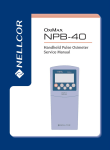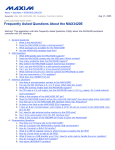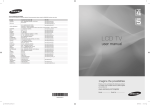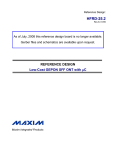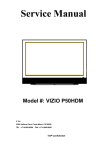Download Maxim HFRD-34.0 Specifications
Transcript
Reference Design: HFRD-34.0 Rev. 3; 05/08 REFERENCE DESIGN 4 x 4 DVI KVM Switch Maxim Integrated Products 4 x 4 DVI™ KVM Switch 1 Table of Contents 2. Features....................................................... 2 3. Overview .................................................... 2 4. Application Diagrams................................. 3 5. Functional Diagrams................................... 4 6. IC Summary................................................ 7 7. Navigation Menu ........................................ 12 8. Schematics, Component List and Layout Drawings ........................................ 15 9. Gerber Files and Firmware ......................... 15 10. Design Notes ............................................ 15 11. Evaluation/Use Notes ............................... 16 12. Layer Profile............................................. 16 13. Board Dimensions .................................... 17 2 Features • • • • • • • 4 x 4 video, audio, and USB switch Fully buffered signals for extended reach Supports DVI resolutions up to 1920 x 1200 per port Simple navigation switch/LCD control DVI data-input equalization and adjustable data-output preemphasis Schematics and Bill of Materials provided Firmware and Gerber files available Reference Design HFRD-34.0 (Rev.3, 05/08) 3 Overview High-Frequency Reference Design (HFRD)-34.0 is a fully buffered 4 x 4 DVI KVM switch. The design switches high-resolution DVI video (up to 1920 x 1200 resolution), analog audio, and USB signals from one to four inputs to one to four outputs. HFRD-34.0 supports both video and audio fanout operation (one source to multiple outputs). The reference design also provides 1:2 hubs on each USB port for keyboard and mouse connections of up to four different users. All signals are fully buffered, allowing extended connection distances. Additionally, equalization is provided on all DVI data input signals and adjustable preemphasis on all DVI data outputs. All control and configuration selections are made through a simple navigational switch and LCD display. This document provides an overview of the design and operation of HFRD-34.0. Maxim Integrated Products Page 2 of 17 4 Application Diagrams HFRD-34.0 can be configured in a variety of application environments. Three possible applications are shown in Figures 1 through 3 below. DVI KVM SWITCH - App1 (2-Person Work Station) USER 2 USER 1 SHARED Figure 1. Typical application. DVI KVM SWITCH - App2 (4-Person Work Station) USER 1 USER 2 USER 3 USER 4 SHARED Figure 2. Typical application. Reference Design HFRD-34.0 (Rev.3, 05/08) Maxim Integrated Products Page 3 of 18 DVI KVM SWITCH - App3 (Single User Work Station) USER 1 SHARED Figure 3. Typical application. 5 Functional Diagrams HFRD-34.0 Top-Level Functional Diagram DVI In2 B US 1 In DVI Out2 DVI Out3 DVI Out4 DV II n4 Video Section B US 2 In US In B 3 MAX3845 MAX4814 MAX3814 MAX3208 Audio In2 Audio In1 USB2512 USB2513 MAX4906 MAX3207 MAX1953 MAX1563 MAX1853 Audio Section Audio Out1 LCD Display Audio In4 MAX4550 MAX9723 MAX9728 Controller ATMEGA168 USB HUB1 US In B 4 Audio In3 USB Section Power o di Au ut3 O B US B3 HU DVI In3 NAV Switch Audio Out2 DV DVI Out1 n1 II USB HUB2 Au Ou dio t4 U HU SB B4 Figure 4. HFRD-34.0 Top-level functional diagram. Reference Design HFRD-34.0 (Rev.3, 05/08) Maxim Integrated Products Page 4 of 18 Video-Section Functional Diagram I2C 5 MAX4814 x2 5 5 5 Low-Speed Video Signals High-Speed Video Signals 8 DVI In1 8 DVI In2 8 DVI In3 8 DVI In4 MAX3208 x2 MAX3814 MAX3208 x2 DVI Out1 MAX3208 x2 MAX3814 MAX3208 x2 DVI Out2 MAX3208 x2 MAX3814 MAX3208 x2 DVI Out3 MAX3208 x2 MAX3814 MAX3208 x2 DVI Out4 ESD Equalizers MAX3845 x2 Switch/MUX ESD Figure 5. Video-section functional diagram. Audio-Section Functional Diagram Audio In1 MAX9723 2 Audio In2 2 2 Audio In3 Audio In4 I2C 2 Audio Out1 Headphone Driver TVS TVS TVS MAX4550 x2 With Click/Pop Suppression TVS ESD MAX9723 TVS Headphone Driver TVS MAX9728 TVS Line Out Driver TVS MAX9728 Switch Line Out Driver Audio Out2 Audio Out3 ESD Audio Out4 Audio Buffers Figure 6. Audio-section functional diagram. Reference Design HFRD-34.0 (Rev.3, 05/08) Maxim Integrated Products Page 5 of 18 USB-Section Functional Diagram I2C 2 USB 1 4 MAX3207 USB2512 MAX3207 USB2512 2 USB 2 MAX4906 x8 MAX3208 USB HUB 2 2 - Port MAX3208 USB HUB 3 2 - Port USB HUB 4 2 - Port 4 MAX3207 USB2512 MAX3207 USB2513 MAX3208 HUB Controllers ESD 2 USB 4 USB HUB 1 2 - Port 4 2 USB 3 MAX3208 4 ESD Switches Data Power 2 MAX1558 2 MOSFETs x12 MAX1558 2 MAX1558 Power Switches 2 Main Supply MAX1558 Overcurrent Protection Figure 7. USB-section functional diagram. Reference Design HFRD-34.0 (Rev.3, 05/08) Maxim Integrated Products Page 6 of 18 6 IC Summary A summary of the ICs used in this reference design is provided below, along with links to additional information for each device. HFRD-34.0 demonstrates the operation of a small sample of Maxim’s digital and analog switches, digital video equalizers, power-management products, and audio drivers. For additional information about other Maxim products for this and many other applications, please visit: www.maxim-ic.com. Video Section Components Part Number Functional Description MAX3845 The MAX3845 is a TMDS® 2-to-4 fanout switch and cable driver for multimonitor distribution of DVI or HDMI™ (high-definition multimedia interface) signaling up to 1.65Gbps. Both inputs and outputs are standard TMDS signaling, as per DVI and HDMI standards. Because TMDS links are “point-to-point,” buffering is required for fanout applications. Four DVI/HDMI TMDS outputs are provided for fanout distribution. Each TMDS output can be independently sourced from either input or can be turned off. Each TMDS input or output is composed of four differential channels that can be arbitrarily assigned to the three data signals and the 1/10th-rate clock. The data rate depends on resolution, but it can vary from 250Mbps (VGA) to 1.65Gbps (UXGA or 1080p/60). Typical applications include multiroom display of the same video source, and industrial and commercial signage applications such as airport monitors or trading-room floor displays. The MAX3845 includes selectable output preemphasis that extends output cable reach up to an additional 7m. Additional information: www.maxim-ic.com/MAX3845 MAX3814 The MAX3814 TMDS EQ/driver compensates for FR-4 and cable losses to the DVI/HDMI transmit connector, and provides a fully compliant DVI/HDMI TMDS output. The device can also be used in DVI/HDMI cable applications to extend reach and improve jitter margin of cable channels at the receive-side connector. Additional information: www.maxim-ic.com/MAX3814 MAX4814E The MAX4814E bidirectional 2:4 HDMI switch provides routing for low-frequency signals. The MAX4814E operates from a single +5.0V ±10% supply voltage and is ideal for connecting multiple HDMI sources to multiple loads. Additional information: www.maxim-ic.com/MAX4814 MAX3208 The MAX3208E is a low-capacitance, ±15kV ESD-protection diode array with an integrated transient voltage suppressor (TVS) clamp. The device is suitable for high-speed and generalsignal ESD protection. Low input capacitance makes this device ideal for ESD protection of signals in HDTV; PC monitors (DVI, HDMI); PC peripherals (FireWire®, USB 2.0); server interconnect (PCI Express®, Infiniband®); datacom; and interchassis interconnect. Additional information: www.maxim-ic.com/MAX3208 Reference Design HFRD-34.0 (Rev.3, 05/08) Maxim Integrated Products Page 7 of 18 USB Section Components Part Number MAX4906F Functional Description The MAX4906F analog multiplexer combines the low on-capacitance (CON) and low onresistance (RON) necessary for high-performance switching applications. This device is designed for USB 2.0 Hi-Speed applications at 480Mbps. The MAX4906F also handles all the requirements for USB low- and full-speed signaling. Additional information: www.maxim-ic.com/MAX4906F USB251x SMSC’s USB251x is a family of versatile, cost-effective, and power-efficient USB 2.0 hub controllers. Leveraging innovative MultiTRAK™ technology that delivers industry-leading data throughput in mixed-speed USB environments, the USB251x family is a USB port-expansion solution for applications that demand low power and small footprint without compromising on performance. Additional information: www.smsc.com MAX4899AE The MAX4899AE analog multiplexer combines the low on-capacitance (CON) and low onresistance (RON) necessary for high-performance switching applications. This device is designed for USB 2.0 Hi-Speed applications at 480Mbps. The MAX4899AE also handles all the requirements for USB low- and full-speed signaling. Additional information: www.maxim-ic.com/MAX4899AE MAX3207 The MAX3207E is a low-capacitance, ±15kV ESD-protection diode array with an integrated TVS clamp. The device is suitable for high-speed and general-signal ESD protection. Low input capacitance makes this device ideal for ESD protection of signals in HDTV; PC monitors (DVI, HDMI); PC peripherals (FireWire, USB 2.0); server interconnect (PCI Express, Infiniband); datacom; and interchassis interconnect. Additional information: www.maxim-ic.com/MAX3207 MAX1558H The MAX1558H is a dual, current-limited switch with autoreset that latches the switch off if it is shorted for more than 20ms, thus saving system power. The shorted output is then tested to determine when the short is removed so the channel can restart automatically. Each channel delivers up to 1.2A and meets all IEC specifications for USB ports. The MAX1558H safety features ensure that the USB port is protected. Additional information: www.maxim-ic.com/MAX1558H Reference Design HFRD-34.0 (Rev.3, 05/08) Maxim Integrated Products Page 8 of 18 Audio Section Components Part Number MAX4550 Functional Description The MAX4550 serial-interface, programmable, dual 4x2 audio/video crosspoint switch is ideal for multimedia applications. It contains two identical crosspoint switch arrays, each with four inputs and two outputs. To improve off-isolation, the additional crosspoint inputs, SA and SB, can be used as shunts. The output is selectively programmable for clickless or regular mode operation. A set of internal resistive voltage-dividers supplies DC bias for each output when using AC-coupled inputs. Additionally, four auxiliary outputs control additional circuitry through the MAX4550’s 2-wire interface. Additional information: www.maxim-ic.com/MAX4550 MAX9728A The MAX9728A stereo headphone amplifier is designed for display and notebook applications or portable equipment where board space is at a premium. This device uses a unique, patented DirectDrive™ architecture to produce a ground-referenced output from a single supply, thereby eliminating the need for large DC-blocking capacitors. It saves cost, board space, and component height. The MAX9728A offers an externally adjustable gain and delivers up to 60mW per channel into a 32Ω load with 0.02% THD+N. An 80dB at 1kHz power-supply rejection ratio (PSRR) allows these devices to operate from noisy digital supplies without an additional linear regulator. Comprehensive click-and-pop circuitry suppresses audible clicks and pops at startup and shutdown. Additional information: www.maxim-ic.com/MAX9728A The MAX9723 stereo DirectDrive™ headphone amplifier with BassMax and volume control is ideal for portable audio applications where space is at a premium and high performance is essential. The MAX9723 operates from a single 1.8V to 3.6V power supply. The device includes features that reduce external component count, system cost, and board space; other features improve audio reproduction. The headphone amplifier uses Maxim’s patented DirectDrive architecture that produces a ground-referenced output from a single supply, thereby eliminating the need for large DC-blocking capacitors. MAX9723 The headphone amplifiers deliver 62mW into a 16Ω load, feature low 0.006% THD+N, and high 90dB PSRR. The MAX9723 features Maxim’s industry-leading click-and-pop suppression. The BassMax feature boosts the amplifier’s bass response, thus improving audio reproduction when inexpensive headphones are used. The integrated volume control features 32 discrete volume levels, eliminating the need for an external potentiometer. BassMax and the volume control are enabled through the I2C/SMBus™-compatible interface. Shutdown is controlled through either the hardware or software interfaces. Additional information: www.maxim-ic.com/MAX9723 Reference Design HFRD-34.0 (Rev.3, 05/08) Maxim Integrated Products Page 9 of 18 Control, Power Management, and Miscellaneous Components Part Number Functional Description The ATMega48 is a low-power CMOS 8-bit microcontroller based on the AVR enhanced RISC architecture. By executing instructions in a single clock cycle, the ATMega48 achieves throughputs approaching 1 MIPS per MHz, allowing the system designer to optimize power consumption versus processing speed. ATMEGA48 The ATMega48 features a multiple-input 10-bit ADC, an 8-bit and a 16-bit timer with two PWM outputs each, an internal 8MHz oscillator, a 2-wire compatible interface, and a POR and brown-out circuit. The ATMega48 provides 4k flash, 256B of EEPROM, and 512B of SRAM. Additional information: www.atmel.com MAX7312 The MAX7312 2-wire-interfaced expander provides 16-bit parallel input/output (I/O) port expansion in SMBus and I2C applications. The MAX7312 consists of input port registers, output port registers, polarity inversion registers, configuration registers, a bus timeout register, and an I2C-compatible serial interface logic, compatible with SMBus. Additional information: www.maxim-ic.com/MAX7312 MAX3397E The MAX3397E ±15kV ESD-protected, bidirectional level translator provides level shifting for data transfer in a multivoltage system. Externally applied voltages, VCC and VL, set the logic levels on either side of the device. A logic-low signal present on the VL side of the device appears as a logic-low signal on the VCC side of the device, and vice versa. The MAX3397E utilizes a transmission and gate-based design to allow data translation in either direction on any single data line. Additional information: www.maxim-ic.com/MAX3397E MAX6348 The MAX6348 microprocessor ( P) supervisory circuit monitors the power supplies in P and digital systems. This device provides excellent circuit reliability and low cost by eliminating external components and adjustments when it is used with 2.5, 3, 3.3, and 5V powered circuits. The MAX6348 asserts a reset signal whenever the VCC supply voltage declines below a preset threshold; the device keeps the signal asserted for at least 100ms after VCC has risen above the reset threshold. Additional information: www.maxim-ic.com/MAX6348 MAX1563 The MAX1563 single, current-limited switch provides up to 4A to power up to eight USB ports. It operates from a 4V to 5.5V input supply, and consumes only 40 A of quiescent current when operating and only 3 A in shutdown. Additional information: www.maxim-ic.com/MAX1563 Reference Design HFRD-34.0 (Rev.3, 05/08) Maxim Integrated Products Page 10 of 18 MAX1853 The MAX1853 monolithic, CMOS charge-pump voltage inverter in the ultra-small SC70 package features a low 15Ω output resistance, which permits loads up to 30mA with maximum efficiency. The MAX1853 is available with an operating frequency of 200kHz, allowing optimization of supply current or external component size. Small external components and micropower shutdown mode make this device ideal for both batterypowered and board-level voltage conversion applications. Additional information: www.maxim-ic.com/MAX1853 MAX6817 The MAX6817 dual switch debouncer provides clean interfacing of mechanical switches to digital systems. The device accepts one or more bouncing inputs from a mechanical switch and produces a clean digital output after a short, preset qualification delay. Both the switch opening and closing bounces are removed. Robust switch inputs handle ±25V levels and are ±15kV ESD protected for use in harsh industrial environments. The MAX6817 features single-supply operation from +2.7V to +5.5V. Undervoltage lockout circuitry ensures that the output is in the correct state upon power-up. The MAX6817 is offered in a SOT package and requires no external components. Additional information: www.maxim-ic.com/MAX6817 MAX1953 The MAX1953/MAX1954/MAX1957 is a family of versatile, economical, synchronous currentmode, pulse-width modulation (PWM) buck controllers. These step-down controllers are targeted for applications where cost and size are critical. The MAX1953 operates at a fixed 1MHz switching frequency, thus significantly reducing external component size and cost. Additionally, excellent transient response is obtained using less output capacitance. The MAX1953 operates from low 3V to 5.5V input voltage and can supply up to 10A of output current. Selectable current limit is provided to tailor to the external MOSFETs’ on-resistance for optimal cost and performance. The output voltage is adjustable from 0.8V to 0.86VIN. Additional information: www.maxim-ic.com/MAX1953 MAX4070 The MAX4069–MAX4072 low-cost, bidirectional, high-side, current-sense amplifiers are ideal for monitoring battery charge and discharge currents in notebook PCs, cell phones, and other portable equipment. The devices feature up to 24V input common-mode voltage range, low 100 A supply current (which drops to only 10 A in shutdown), and a total output error of less than 1.5%. The wide 1.35V to 24V input common-mode range is independent of the supply voltage, thus ensuring that the current-sense feedback remains accurate even when connected to a battery pack in deep discharge. Additional information: www.maxim-ic.com/MAX4070 Reference Design HFRD-34.0 (Rev.3, 05/08) Maxim Integrated Products Page 11 of 18 MAX3420 The MAX3420E contains the digital logic and analog circuitry necessary to implement a fullspeed USB peripheral compliant to USB specification rev 2.0. A built-in full-speed transceiver features ±15kV ESD protection and programmable USB connect and disconnect. An internal serial-interface engine (SIE) handles low-level USB protocol details such as error checking and bus retries. The MAX3420E operates using a register set accessed by an SPI™ interface that operates up to 26MHz. Any SPI master (microprocessor, ASIC, DSP, etc.) can add USB functionality by using the simple 3- or 4-wire SPI interface. Additional information: www.maxim-ic.com/MAX3420 MAX4788 The MAX4785–MAX4788 family of switches feature internal current limiting to prevent host devices from being damaged due to faulty load conditions. These analog switches have a low 0.7Ω on-resistance and operate from a 2.3V to 5.5V input voltage range. They are available with guaranteed 50mA and 100mA current limits, making them ideal for load-switching applications. Additional information: www.maxim-ic.com/MAX4788 7 Navigation Menu HFRD-34.0 is controlled through an easy-to-use navigation switch (up, down, left, right, and push to select) and LCD display. Through this menu- based interface, the user can set, save, and load configurations and control a variety of other features available in the reference design. The table below details the menu options available. Table 1. Navigation Menu Details Menu* Index LCD Label Action Taken by Pushing “Select” on Menu Item MM 1 Configuration Configuration Menu (CM) is opened MM 2 Video Switch Video Switch Menu (VSM) is opened MM 3 Audio Switch Audio Switch Menu (ASM) is opened MM 4 USB Switch USB Switch Menu (USM) is opened MM 5 Audio Control Audio Control Menu (ACM) is opened MM 6 Advanced Ctrl Advanced Control Menu (ADVM) is opened CM 1 Load Config Opens a menu to allow the user to load one of four saved configurations. CM 2 Save Config Opens menu to allow the user to save the current configuration to one of four memory locations. Saved configurations are retained during power cycles. Reference Design HFRD-34.0 (Rev.3, 05/08) Maxim Integrated Products Page 12 of 18 CM 3 Default Sets the default configuration for the reference (Audio/Video/USB In1 to Audio/Video/USB Audio/Video/USB In2 to Audio/Video/USB Out2, etc.) CM 4 Demo Mode Puts the reference design into a demonstration mode. When in this mode, the controller will loop through the default and saved configurations at a preset time interval. This operation allows for automatic switching of the DVI and audio signals. Please note: The USB configuration is not switched in demo mode (only DVI and Audio). CM 5 Main Menu Return to Main Menu VSM 1 DVI Out1 Allows the user to switch DVI output 1 to any DVI input (1 through 4). The current switch selection is highlighted. VSM 2 DVI Out2 Allows the user to switch DVI output 2 to any DVI input (1 through 4). The current switch selection is highlighted. VSM 3 DVI Out3 Allows the user to switch DVI output 3 to any DVI input (1through 4). The current switch selection is highlighted. VSM 4 DVI Out4 Allows the user to switch DVI output 4 to any DVI input (1through 4). The current switch selection is highlighted. VSM 5 Main Menu Return to Main Menu ASM 1 HeadphoneOut1 Allows the user to switch headphone output 1 to any audio input (1 through 4). The current switch selection is highlighted. ASM 2 HeadphoneOut1 Allows the user to switch headphone output 2 to any audio input (1 through 4). The current switch selection is highlighted. ASM 3 Line Out1 Allows the user to switch line output 1 to any audio input (1 through 4). The current switch selection is highlighted. ASM 4 Line Out2 Allows the user to switch line output 2 to any audio input (1 through 4). The current switch selection is highlighted. ASM 5 Main Menu Return to Main Menu USM 1 USB HUB1 Out Allows the user to switch USB hub 1 to any USB input (1 through 4). The current switch selection is highlighted. Note: Fanout is not supported in the USB switch. USM 2 USB HUB2 Out Allows the user to switch USB hub 2 to any USB input (1 through 4). The current switch selection is highlighted. Note: Fanout is not supported in the USB switch. USM 3 USB HUB3 Out Allows the user to switch USB hub 3 to any USB input (1 through 4). The current switch selection is highlighted. Note: Fanout is not supported in the USB switch. USM 4 USB HUB4 Out Allows the user to switch USB hub 4 to any USB input (1through 4). The current switch selection is highlighted. Note: Fanout is not supported in the USB switch. USM 5 Main Menu Return to Main Menu ACM 1 HP1 Volume Allows the user to adjust headphone 1 output volume (1 through 7). Reference Design HFRD-34.0 (Rev.3, 05/08) design Out1; Maxim Integrated Products Page 13 of 18 The current volume selection is highlighted. ACM 2 HP2 Volume Allows the user to adjust headphone 2 output volume (1through 7). The current volume selection is highlighted. ACM 3 Main Menu Return to Main Menu ADVM 1 DVI1 Pre-Emph Allows the user to adjust DVI Out 1 preemphasis level between 0dB, 3dB, and 6dB. The preemphasis can be increased to improve signal integrity when using long cables between HFRD-34.0 and the monitor. ADVM 2 DVI2 Pre-Emph Allows the user to adjust DVI Out 2 preemphasis level between 0dB, 3dB, and 6dB. The preemphasis can be increased to improve signal integrity when using long cables between HFRD-34.0 and the monitor. ADVM 3 DVI3 Pre-Emph Allows the user to adjust DVI Out 3 preemphasis level between 0dB, 3dB, and 6dB. The preemphasis can be increased to improve signal integrity when using long cables between HFRD-34.0 and the monitor. ADVM 4 DVI4 Pre-Emph Allows the user to adjust DVI Out 4 preemphasis level between 0dB, 3dB, and 6dB. The preemphasis can be increased to improve signal integrity when using long cables between HFRD-34.0 and the monitor. ADVM 5 Main Menu Return to Main Menu *Abbreviations: MM: Main Menu; CM: Configuration Menu; VSM: Video Switch Menu; ASM: Audio Switch Menu; USM: USB Switch Menu; ACM: Audio Control Menu; ADVM: Advanced Control Menu. Reference Design HFRD-34.0 (Rev.3, 05/08) Maxim Integrated Products Page 14 of 18 8 Schematics, Component List, and Layout Drawings The full schematics, component list, and PCB layout drawings are available to download in PDF format at: http://www.maximic.com/tools/other/appnotes/4232/4232_softwar e.zip. See sections 10 and 11 for additional details regarding the use of the schematics and layout drawings for new designs. 9 Gerber Files and Firmware The Gerber files and firmware assist design engineers in developing their projects, and are available to Maxim customers upon request. See sections 10 and 11 for additional details regarding the use of Gerber files and firmware. To receive the Gerber or firmware files, please send an email to [email protected] with HFRD34.0 in the subject line. Include the following information: 1. 2. 3. 4. Your name Company name Company website Brief description of your project 10 Design Notes Please review the following design notes: 1. Line Out1 and Line Out2 are designed to drive an audio line impedance (> 1kΩ) with typical line-out voltage levels. These two audio outputs can be optimized to drive headphone loads by changing external component values. See the MAX9728 data sheet for additional information. 2. The USB hub controllers (U26, U27, U36, and U39) have configurations and settings that can be adjusted through a 2wire bus controlled by the C. Currently Reference Design HFRD-34.0 (Rev.3, 05/08) these features and configurations are set through the C firmware. 3. The USB HUB reset connection for the four HUBs (pin 26 of USB2512 and USB2513 devices) are tied together on the current version of the reference design. Splitting these connections to have individual control will improve the overall USB switching operation. 4. If desired, U47 (MAX3420) is provided to facilitate control of the switch through a USB interface. Currently these features are not preprogrammed into the reference design. 5. USB HUB 4 is a self-powered HUB (power is drawn from the HFRD-34.0 supply). USB HUBs 1-3 are powered from the host. All USB HUBs include overcurrent shutdown protection. 6. It is recommended that you increase the supply filtering (i.e., add series inductance and bulk capacitance) of the host USB power supplies (for HUBs 1-3) in order to reduce crosstalk from the USB powersupply noise to the audio outputs. 7. The power MOSFET transistors (Q2Q13) used for switching the USB host power are flipped over due to a layout error in the pin order. When copying this section of the design, the transistor footprint should be corrected. 8. The ATMEL C (U49, ATMEGA168) can be in-circuit reprogrammed to perform custom features. Use the AVRISP-MKII programmer and the connections provided through J15. 9. A 10kΩ pull-up resistor should be added to pin 9 of the MAX3420 (U47) in any design revisions. 10. Connecting pins 14 and 16 together on each DVI input will increase the Maxim Integrated Products Page 15 of 18 compatibility of the reference design with a wider variety of DVI video cards. 11 Evaluation/Use Notes This reference design aids designers and is not intended to replace the entire design process. The designer should evaluate the reference design and modify it, as necessary, to meet the specification for a particular project. The designer should also carefully consider safety and EMI issues related to the specific application. 2. 0.5oz copper foil before platting. 3. For USB signal-transmission lines: 10mil W, 8mil S -> 90Ω Ω Differential 4. For DVI signal-transmission lines: 8mil W, 8mil S -> 100Ω Ω Differential Table 2. HFRD-34.0 Layer Profile Layer Dielectric Thickness (inches) 1 Copper Clad Layer Desc. 0.5 SIGNAL 0.5 PLANE 0.5 SIGNAL 0.5 SIGNAL 0.5 PLANE 0.5 SIGNAL 0.5 PLANE 0.5 SIGNAL 0.5 PLANE 0.5 SIGNAL 0.0081 2 0.005 Maxim cannot assume responsibility for use of any circuitry other than circuitry entirely embodied in a Maxim product. No circuit patent licenses are implied. Maxim reserves the right to change the circuitry and specifications without notice at any time. 3 0.0036 4 0.005 5 0.0088 6 12 Layer Profile The HFRD-34.0 DVI KVM switch includes controlled-impedance transmission lines. The layer profile is based on the following assumptions: 1. Dielectric material is FR-4 with a dielectric constant of ~ 4.2. 0.005 7 0.0036 8 0.005 9 0.0081 10 Maxim cannot assume responsibility for use of any circuitry other than circuitry entirely embodied in a Maxim product. No circuit patent licenses are implied. Maxim reserves the right to change the circuitry and specifications without notice at any time. Reference Design HFRD-34.0 (Rev.3, 05/08) Maxim Integrated Products Page 16 of 18 1312 Board Dimensions Figure 8. HFRD-34.0 Board dimensions (not to scale). Reference Design HFRD-34.0 (Rev.3, 05/08) Maxim Integrated Products Page 17 of 18 DVI is a trademark of Digital Display Working Group (DDWG). FireWire is a registered trademark of Apple Computer, Inc. HDMI is a trademark of HDMI Licensing, LLC. InfiniBand is a registered trademark of InfiniBand Trade Association. MultiTRAK is a trademark of Standard Microsystems Corporation. PCI Express is a registered trademark of PCI-SIG Corp. SMBus is a trademark of Intel Corporation. SPI is a trademark of Motorola, Inc. TMDS is a registered trademark of Silicon Image, Inc. Reference Design HFRD-34.0 (Rev.3, 05/08) Maxim Integrated Products Page 18 of 18




















